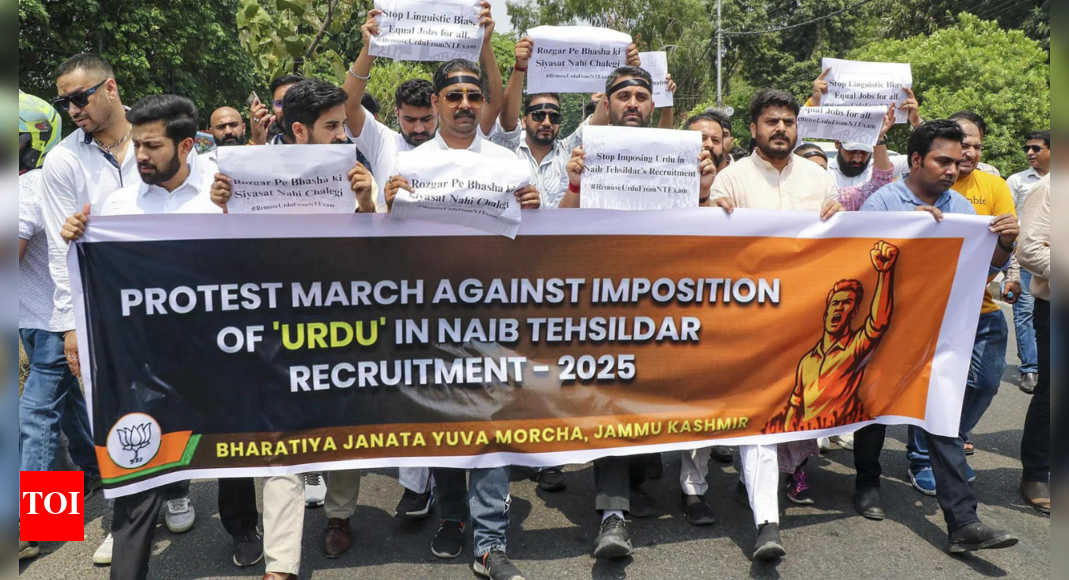BJP Slams Urdu Mandate for Naib Tehsildar Posts: Accuses J&K Govt of Discrimination
By: Javid Amin | Srinagar | 10 July 2025
A Controversial Decision
The Jammu & Kashmir government, led by Omar Abdullah and the National Conference (NC), has triggered political uproar after it announced a decision to make Urdu mandatory for Naib Tehsildar posts in the revenue department. The policy shift, as per an official order issued last week, has been strongly opposed by the Jammu & Kashmir unit of the Bharatiya Janata Party (BJP).
At a strategy meeting chaired by state BJP president Sat Sharma and addressed by Leader of the Opposition Sunil Sharma, the party unanimously condemned the move, terming it a “deliberate injustice” to the youth of Jammu and a “throwback to divisive policies” of past NC regimes.
BJP’s Allegations: “This is Not Equality, It’s Exclusion”
In a joint statement, the BJP leadership minced no words:
“This is a calculated attempt to deprive Jammu’s youth of equal opportunities. We will not allow such injustice to be repeated.”
The party argued that the move violates the equal official status granted to languages such as Dogri, Hindi, Kashmiri, Urdu, and English under the Jammu and Kashmir Official Languages Act, 2020. By insisting on Urdu for a key post in the revenue department, the BJP claimed the government was “institutionalizing linguistic discrimination”.
Counterpoints Raised by BJP:
1. Multi-Language Functionality Already Exists
Revenue documents like passbooks are issued in Urdu, Hindi, and English already. This proves Urdu is not essential as the sole medium.
2. Impact on Jammu-Based Aspirants
Many candidates from Jammu and Ladakh regions come from Dogri and Hindi-speaking backgrounds, lacking fluency in Urdu.
3. Violation of Equal Status Policy
The mandate undermines linguistic parity and may be unconstitutional if it privileges one official language over others.
4. Political Motivations Suspected
BJP hinted this could be a vote-bank appeasement tactic aimed at consolidating specific linguistic communities.
Broader Implications: The Language vs Employment Debate
The controversy taps into a larger debate around language as a prerequisite for public sector employment in India. While linguistic requirements can serve administrative purposes, critics argue that such conditions:
- Narrow the talent pool
- Discriminate against regional language speakers
- Turn neutral posts into political fault lines
“No qualified youth should be barred from serving their own state just because they didn’t learn Urdu in school.” — Sunil Sharma, BJP Leader of Opposition
Warning of Mass Protests
In their final warning, the BJP stated:
“If this order is not rolled back immediately, we will mobilize mass protests across Jammu region. This is about justice, equality, and fair governance.”
Other Concerns Raised by BJP in the Meeting
1. Nai Basti Displacement
- BJP flagged the displacement of traders in Nai Basti due to highway expansion.
- The party called for compensation, relocation plans, and consultation with stakeholders.
2. Toll Plazas Opposition
- The BJP strongly opposed the establishment of new toll plazas, citing increased burden on commuters and traders.
Political Response Awaited
The Omar Abdullah-led NC government has yet to respond publicly to the BJP’s allegations. However, senior NC leaders have previously argued that Urdu is the administrative backbone of J&K’s revenue system.
Observers say the issue could snowball into a bigger electoral debate as J&K gears up for local body and legislative elections in the coming months.
Editorial Note: Balancing Identity and Inclusion
Language is a powerful identity marker in Jammu & Kashmir, where regional, religious, and ethnic diversity demands inclusive governance. Any policy that seems to favour one language over others risks creating unintended fissures.
The need of the hour is transparent, inclusive policy-making that:
- Respects constitutional multilingualism
- Ensures fair access to employment
- Avoids politicization of identity issues



